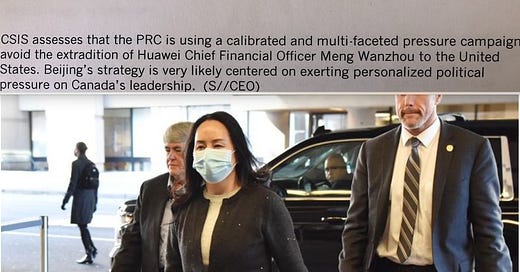Beijing backed Trudeau while "calibrating" support for 2019 Election to influence Meng case: CSIS documents
"CSIS assesses PRC seeks to exert pressure on Canada’s political leaders by clandestinely interfering in Canadian democratic institutions in the run-up to the 2019 federal election": June 2019 report

The Ministry of State Security, China’s feared secret police, strategically calibrated Beijing’s support for Liberal Prime Minister Justin Trudeau in the 2019 election, seeking to halt Meng Wanzhou’s extradition to the United States by backing some non-Liberal candidates and running operations “primarily designed to exert political and personal pressure on Canada’s political leadership,” CSIS reported in June 2019.
The bombshell “Canadian Eyes Only” intelligence assessment, reviewed exclusively by The Bureau, was disseminated in Ottawa months before the October 2019 vote.
It reveals allegations never reported in Canadian media.
And for the first time, leaked CSIS intelligence plausibly outlines how the interlocked detentions of Huawei’s chief financial officer and the Two Michaels drove Beijing’s deep interference in Canada’s 2019 and 2021 contests.
Titled “PRC Strategy and Tactics to Influence the Meng Proceedings” it also exposes serious information gaps in Ottawa’s Foreign Interference Commission hearings.
The Commission is mandated to determine whether Beijing interfered in Canada’s 2019 and 2021 elections, whether Trudeau and his senior officials were warned by CSIS of China’s partisan meddling, and whether they responded sufficiently, or at all.
Trudeau and his senior minister Dominic LeBlanc and chief of staff Katie Telford have cast doubt in Commission hearings on intelligence from 2021 suggesting the Prime Minister’s party was favoured by Beijing, and that a Chinese diplomat in Vancouver had bragged of defeating two Conservative MPs.
But the June 2019 CSIS document reviewed by The Bureau is more definitive than previously leaked records.
It points singularly at Justin Trudeau, indicating the Liberal Prime Minister was clandestinely supported by Beijing, according to “multiple corroborated reports” collected in 2019 from numerous “PRC missions in Canada.”
But Chinese agents moderated their support for Trudeau and Liberal candidates, the sensitive CSIS report says, with Beijing “hedging its bets” ahead of the 2019 vote in order to maximize influence on the Meng proceedings.
The Bureau asked the Commission whether it has reviewed documents showing that CSIS reported to the Prime Minister prior to the 2019 election that Beijing was supporting Trudeau but calibrating its election interference to force Meng’s release.
“The Commission will not comment on the status of its investigation, or its investigation plans,” spokesman Michael Tansey responded. Commissioner Marie-Josée Hogue, facing a tight deadline, must file an interim report on May 3.
Other critical pieces of intelligence revealed in the document and not examined in Commission hearings include CSIS’s assessment that Ministry of State Security (MSS) bureaus were tasked “from high levels” to “make the largest possible impact” in Canada’s 2019 election, while MSS agents sought “to influence Canada’s senior leaders by singling out politically-connected members of the business community for trade action.”
The document also sheds greater light on Beijing’s exploitation of Michael Kovrig and Michael Spavor to lure Ottawa into murky backchannel negotiations on Meng’s case.
Shockingly, it reveals Beijing expected Canada would eventually extradite Meng, but the MSS nevertheless rolled out a “multi-faceted pressure campaign” and may even have prepared for a deadly last resort.
“CSIS assesses that the PRC prioritizes avoiding Ms. Meng’s extradition partly due to concern that she may cooperate with U.S. authorities during a criminal trial and reveal privileged information in the process,” the June 10, 2019 CSIS document says. “Uncorroborated single source CSIS reporting indicates that the PRC may consider Ms. Meng's exfiltration or assassination if it becomes the only alternative to significant national harm.”
Charles Burton, a sinologist and former Canadian diplomat in China, called CSIS’s June 2019 assessment a “highly significant document.”
“I think it's a game-changer in terms of the Interference Commission, because it indicates more than other documents we've seen in the past, the degree of sophisticated understanding that CSIS has over Ministry of State Security operations in Canada,” Burton said.




